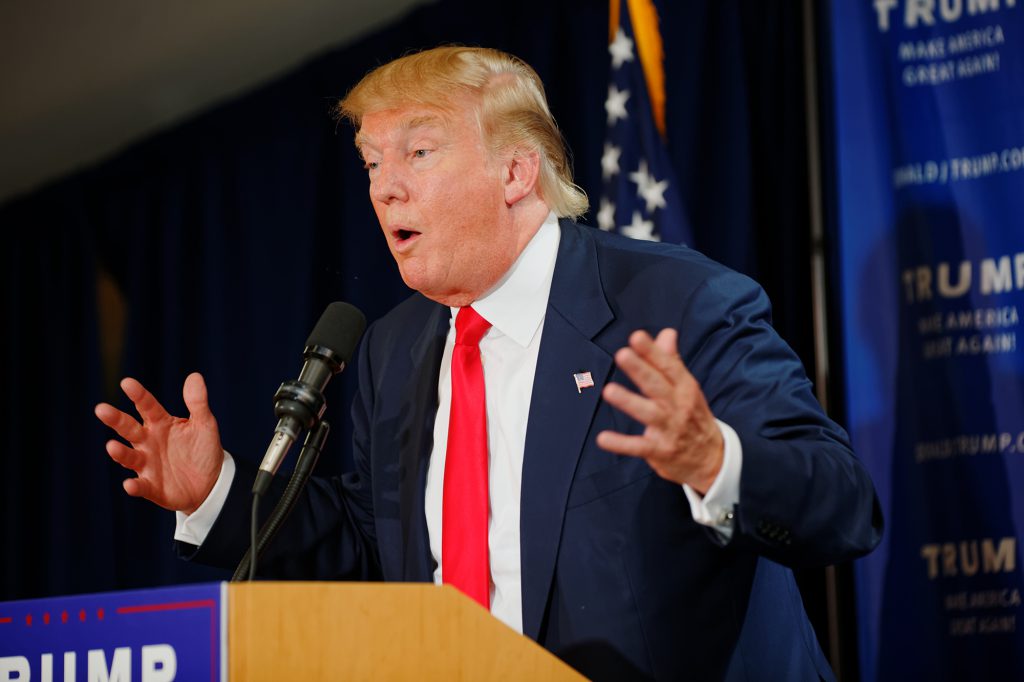Scott Adams, Donald Trump and the Ethics of Persuasion
The answer, it should come as no surprise, is that he uses the very same tactics of evasion and persuasion for which he admires the president.

I recently read Scott Adams’s last book, How to Fail at Almost Everything and Still Win Big, for a book club I’m in with some friends. We tend to eschew self-help books (especially those with hyperbolic, click-baity titles), but many of the principles Adams espouses seemed both sound and contrarian: focus on systems instead of goals, manage your energy instead of your time, add skills instead of becoming an expert. It was, in fact, a very good book, and a persuasive one – and yet all of us were left with the unshakable feeling that we’d been duped. Indeed, the fact that the book was so intoxicating to read made us all more skeptical of Adams’s advice rather than less. As one friend put it at the time, “I feel like I’ve been hypnotized.”

Adams, who created the popular Dilbert comic strip, has been making the podcast rounds of late as an explainer and sometime defender of Donald Trump. His argument is somewhat orthogonal to the traditional pro-Trump case: as a trained hypnotist and longtime student of persuasion, Adams believes that the President’s apparent bluster and dishonesty are actually the work of a “master persuader” with “a set of skills we’ve never seen before.” Though he endorsed Trump for president, Adams only occasionally wades into the weeds of ethics and policy. His primary focus is instead on explaining the various persuasive strategies the president uses, many of which Adams himself endorses. But on a recent episode of Sam Harris’s Waking Up podcast, Adams was tasked with defending the president’s persuasion in ethical terms. The resulting conversation left Harris in a familiar position: as he joked in the introduction, “I may have been hypnotized.”
So what is it about Adams’s style that leaves his interlocutors so vexed? The answer, it should come as no surprise, is that he uses the very same tactics of evasion and persuasion for which he admires the president. Adams does not hide this fact – on the contrary, he celebrates it as the appropriate response to humanity’s basic irrationality. As he tells Harris early in the podcast, “the truth is not as useful as it should be, because it doesn’t change people’s minds.” Whether or not this assessment is accurate, it surely runs counter to the ethos of intellectual honesty that defines Harris’s work. In what follows, I’ll try to do for Adams what Adams does for Trump: uncover the persuasive strategies that underpin his words. In so doing, I hope to make a case for the utility of facts and reason, in spite (or perhaps because) of our irrational nature.
Among the most well-documented and exploitable of cognitive biases is the phenomenon of anchoring, first theorized by Daniel Kahneman and Amos Tversky. This is the tendency to place too much weight on the first piece of information one receives (the “anchor”) when making a judgment under uncertainty. As Kahneman writes in Thinking, Fast and Slow, “If you are asked whether Gandhi was more than 114 years old when he died, you will end up with a much higher estimate of his age at death than you would if the anchoring question referred to death at 35.” Adams views many of Trump’s more outrageous claims as masterful exploitations of this bias. Erroneously estimating his net worth to be $10 billion? The “big first offers” to deport 11 million illegal immigrants and ban all Muslim immigration? All anchoring strategies that reset the public’s intuitions about the facts and ethics at hand.
Adams deploys this tactic multiple times over the course of the Harris podcast, with varying degrees of success. For example, when pressed to defend Trump’s well-attested habit of barging into the women’s dressing room when he owned the Miss USA pageant, Adams first argues that “if you actually knew the secret life of any of our politicians, we would impeach all of them.” This is an astonishing claim and, crucially, an unverifiable one in principle. Whatever one’s initial assumptions about the percentage of government officials with dark secrets, the claim that they’re all impeachable surely resets one’s estimate in the direction of cynicism. Adams later walks back this claim, saying (without admitting any fault) that “it would be more common than not common for [politicians], especially the males, to have sketchy behavior with the opposite sex.” Compared with the “first offer” that every politician has an impeachable history, this seems downright plausible. But it is a far more pessimistic assessment than most of us would likely have come to on our own. And, of course, it says nothing in defense of Trump.
Adams tends to define “anchoring” in ways that extend beyond Kahneman’s initial case, applying it to any instance in which a radical claim resets our intuitions (whether it’s the first piece of information or not). One example Adams loves came when Megyn Kelly pressed then-candidate Trump to defend his lewd statements about women at a debate. Trump interrupted, “Only Rosie O’Donnell,” defusing the question and winning laughter from the crowd. The logic, Adams explains, is that the audience’s negative opinion of O’Donnell provides a stronger “anchor” than Kelly’s question. Thus distracted, they forget to be angry about Trump’s overt sexism. Anchors of this kind need not be true, of course (it was not “only Rosie O’Donnell” that Trump insulted); they need only to distract or call into question.
Adams makes particularly insidious use of this tactic on the podcast when Harris attempts to drill down on the distinction between Trump’s ethics and his persuasiveness. Replying to the claim that Trump’s supporters have never been happier, Harris (noting the extremity of the example) draws an analogy to the Third Reich, pointing out that the support for a leader says nothing about that leader’s ethics. However ill-advised a Hitler analogy may have been from a rhetorical standpoint, the point undoubtedly stands. But Adams seizes upon the opportunity to claim that “when somebody retreats to analogy…it’s because they’ve run out of reasons. Nobody uses an analogy if they have a reason.”

This false generalization saves Adams from having to address the point at hand (that persuasion has nothing to do with ethics), while planting an anchor in the listener’s mind that makes them wary of analogies. Despite Harris’s protestations (“analogies are tools of communication”), the stigma sticks: each subsequent time he uses an analogy, he appears to be flailing. And Adams never fails to remind the audience when he does so. In fact, Adams repeatedly evades Harris’s points through “anchoring” questions designed to make Harris appear unreasonable: “Did you just go full Exorcist?” “Did you just go full Hitler analogy?” “Did you just change the subject?” “Did you just give me another analogy?” All the while, the very straightforward question that Harris asks at the start of the podcast – “where does your appreciation of the [persuasive] artistry grade into actually thinking that [Trump] is good and liable to do good things?” – remains unanswered.
Matters are complicated further by the fact that certain persuasive strategies are difficult to distinguish from mere cordial communication. Two of Adams’s favorite techniques – “embracing the argument” and “pacing and leading” – could easily be construed as adherence to Rapoport’s Rules for honest argumentation. (Devised by Anatol Rapoport and propounded by Daniel Dennett, these rules advise one to restate an opponent’s argument and list points of agreement before beginning a critique.) But as practiced by Adams (and Trump), they become tools of manipulation rather than intellectual honesty. This is evidenced by the fact that Adams embraces arguments in his discussion with Harris that he denies in other contexts.
For example, when defending Trump as an exceptional case, Adams concedes that “there’s greater risk with a President Trump than some vanilla president, but I think his supporters have said, explicitly and often, ‘we’ll take the risk, we’ll take the chaos, that’s the price of change.’” But on his own blog, defending his endorsement of Trump, Adams writes: “If you are not trained in persuasion, Trump look[s] scary. If you understand pacing and leading, you might see him as the safest candidate who has ever gotten this close to the presidency. That’s how I see him.” The blog post was written in 2016, so one could argue that Adams has adjusted his view – but for the fact that he has stressed over and over how developments between then and now have only confirmed his initial position. No doubt Adams knew that he’d have a difficult time convincing Harris that Trump is “the safest candidate who has ever gotten this close to the presidency,” so he opted for the opposite position instead.
This shiftiness is representative of Adams’s attitude toward the truth more generally. Throughout the podcast, he defends many of Trump’s positions as “emotionally” and “directionally” true, even as many of the president’s claims “don’t pass the fact checks.” Adams justifies this lax attitude by citing the prevalence of confirmation bias and cognitive dissonance: if people don’t care about facts, why should we use them? There are at least three related claims being made here, each of which is worth exploring in brief.
The first is about the extent of human irrationality. Adams believes that humans are so hopelessly irrational as to be fooled by even the most naked emotional manipulation. There is certainly some truth to this, particularly as it pertains to moral and political issues. The social psychologist Jonathan Haidt has famously argued that most of our moral judgments are post-hoc rationalizations laid upon knee-jerk emotional reactions. And studies by Geoffrey Cohen at Yale have demonstrated the overwhelming impact of group influence on political beliefs, over and above the factual content of a policy or the personal ideology of the voter. What’s more, the cognitive scientists Hugo Mercier and Dan Sperber have argued that human reason did not evolve to discover the truth at all, but rather to argue and persuade. Score one for Adams.
The second claim is that the problem of human irrationality is intractable, and therefore that we should exploit it rather than combat it. As Adams put it on another podcast, “once you realize that everyone is completely irrational, your life gets a lot easier.” Though they barely touch it directly during the podcast, this is the heart of the disagreement between Harris and Adams. Harris has built a career on identifying, exposing, and confronting various forms of irrationality, all with the stated aim of “build[ing] a bridge to a rational world that the better part of humanity can cross.” He often makes a point of stating the most unpalatable true statement he can think of, just so as to force his listeners to absorb the full implications of an argument. (One example: “there are single zip codes in New York and Massachusetts that have produced more of enduring value…than the entire Muslim world has produced in a thousand years.”) From Adams’s standpoint, Harris’s obsessive scrupulousness and intellectual honesty are, in some respects, just bad persuasion.

But while it’s true that human irrationality runs extraordinarily deep, the problem is not hopeless. As the psychologist Paul Bloom has argued, much of the literature on human unreason belies the vast background of reasonable behavior that goes unremarked upon. “Making it through a single day,” Bloom writes, “requires the formulation and initiation of complex multistage plans, in a world that’s unforgiving of mistakes (try driving your car on an empty tank, or going to work without pants).” Bloom has also noted that, however biased our moral judgments, they have nevertheless arced toward an expansion of moral concern. “If our moral attitudes are entirely the result of nonrational factors, such as gut feelings and the absorption of cultural norms,” he argues, “They shouldn’t show systematic change over human history. But they do.”
Adams’s arguments begin to unravel the moment one looks to the past to account for this change. One can simply ask, as Adams apparently will not, whether societies have experienced greater improvement when they have become more rational, or when they have become more accepting of “emotional” and “directional” truths. As Steven Pinker and others have argued, humanity has a long history of violence and irrationality, interrupted only by the rationalizing forces of the Enlightenment and Scientific Revolution. The moral advances that attended this period are evidence enough that reason, however difficult to come by, is society’s best hope for progress.

Of course, one can only have a conception of “progress” when one embraces certain ethics. This brings me to the third claim underpinning Adams’s arguments, which goes unstated: ethics don’t matter because there is only persuasion. For all his rhetorical acrobatics, Adams manages to skirt the ethics question entirely, for reasons he has since made clear. In a blog post entitled “I’m Not Your Pope (But Thanks for Asking),” Adams faults Harris’s listeners for pressing him to clarify his ethical stance. “I didn’t think my opinion on that topic was useful,” he writes, “because no one gets their ethical guidance from cartoonists. I figured people could work out the morality questions on their own. But I was wrong. The anti-Trumpers need a Pope.”
The transparent evasion should by now be evident. Though he’s loath to say so on the podcast, Adams isn’t interested in defending Trump’s ethics. His actual reasons for supporting the president can be found in a blog post from prior to the election:
I don’t understand the policy details and implications of most of either Trump’s or Clinton’s proposed ideas. Neither do you. But I do understand persuasion. I also understand when the government is planning to confiscate the majority of my assets. And I can also distinguish between a deeply unhealthy person and a healthy person, even though I have no medical training. (So can you.)
Whatever one might feel about the estate tax or Hillary Clinton’s health, it is revealing to see Adams’s motives laid so unpersuasively bare.
The question before us is this: do we want to live in a society that strives, however fumblingly, toward truer and more ethical discourse? Or do we want to surrender to a post-truth world of competitive persuasion and disguised self-interest? For better or worse, the truth (or at least the impulse to discover it) represents our only lasting basis for convergence. Indeed, some fixed picture of what’s true and ethical is the only standpoint from which to judge the “directional” accuracy of the president’s claims. Otherwise, we risk becoming unmoored, vulnerable to the next hypnotist or conman promising to help us win big.











